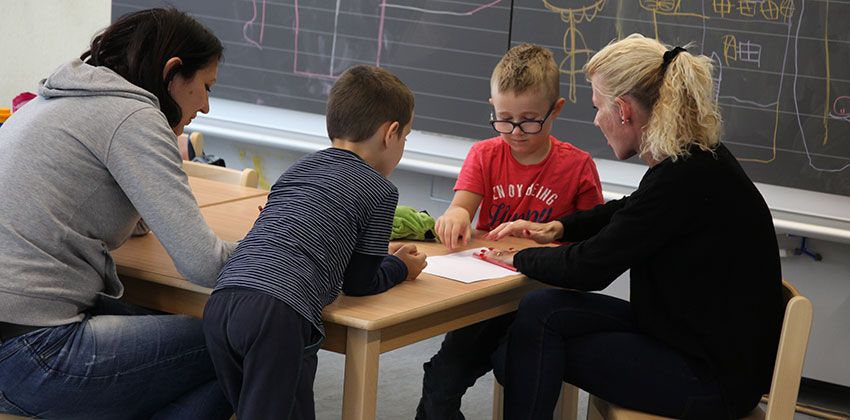Starting kindergarten can be difficult. The Meierhöfli School in Switzerland has launched a new project designed to help children as they make this transition. We take a look at a special kind of kindergarten.
It appears to be a regular day at kindergarten. The children are playing together, running around the room and experimenting with new games. But there’s a striking difference: Also present in the classroom this morning are a number of adults – and it’s because of a new project.
Supporting children
Entry into kindergarten is an important developmental milestone. For many children, this marks the first time that they are leaving their families and having to adjust to a new environment. And now that an optional kindergarten year has been introduced, children are starting kindergarten at an even earlier age. It’s not unusual for the challenges of this new phase to make them feel overwhelmed. A new program – called “family kindergarten” – is an attempt to help these children by bringing their families into the classroom.
Easing the transition
“The project focuses on children who are in need of support as they transition to kindergarten,” says teacher Anita Bürgisser. One morning a week, a group of no more than six kindergartners participate in “family kindergarten,” each accompanied by a parent. They come together with other groups to be taught by a specialized teacher. Parents support their children as they learn to follow the rules and are introduced to new subject matter. The parents receive coaching in the classroom from Yvonne Marbacher, an expert in family counseling, and they also take part in separate counseling sessions. As Anita Bürgisser explains, “Family kindergarten represents a link between the school and the home.”
The project benefits not only the children, but also their parents. “It’s important for parents to be able to share their thoughts and experiences,” says Bürgisser, who helped to develop this project. Parents support and bolster one another. It should also be noted that the program requires a greater commitment on the part of teachers. There are lively discussions between teachers in the regular kindergarten classrooms and the specialized “family kindergarten” teacher.
Networking with the surrounding community
The project was launched as part of the Meierhöfli educational landscape. Like that program, the “family kindergarten” is designed to foster links with the community, but focuses more attention on parents. The “family kindergarten” project began in mid-October 2017. It will undergo evaluation at the end of its one-year test phase. “It won’t be possible to assess our overall success after just one year,” says Bürgisser. “But we hope to be able to continue the project.” Initial findings show that both parents and children are enthusiastic about this new initiative.
Local educational landscapes: Education involves more than just schools
Through its “Educational Landscapes Switzerland” program, the Jacobs Foundation promotes systematic cooperation between schools and providers of educational services outside of the schools, forming local educational landscapes designed to offer children and adolescents better opportunities for education and development. Through cooperation with cantons, communities, associations and experts, the Jacobs Foundation is contributing to the development of innovative programs to benefit Switzerland’s educational system. The Foundation is investing a total of 6.5 million Swiss francs in the program, which runs from 2012 to 2018.
Detailed information about the program can be found at www.bildungslandschaften.ch.
